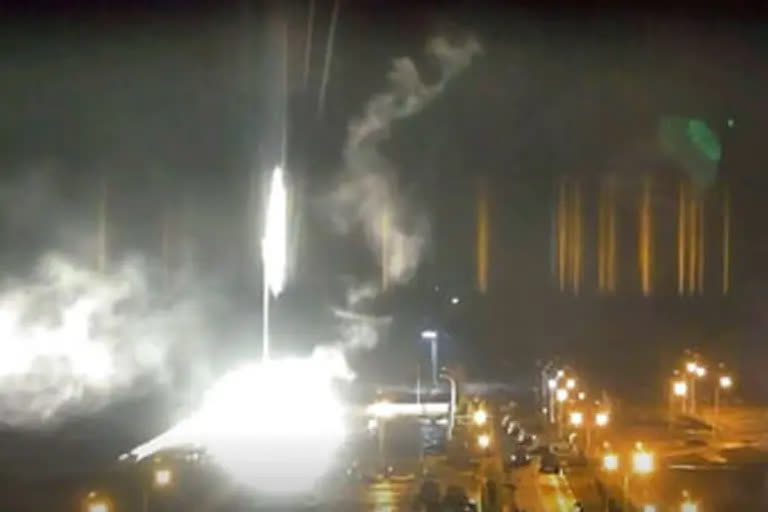Kyiv: Russian troops Friday seized the biggest nuclear power plant in Europe after a middle-of-the-night attack that set it on fire and briefly raised worldwide fears of a catastrophe in the most chilling turn in Moscow's invasion of Ukraine yet. Firefighters put out the blaze, and no radiation was released, U.N. and Ukrainian officials said, as Russian forces pressed on with their week-old offensive on multiple fronts and the number of refugees fleeing the country topped 1.2 million.
While the vast Russian armored column threatening Kyiv appeared stalled outside the capital, President Vladimir Putin's forces have ramped up their use of air power, launching hundreds of missiles and artillery attacks on cities and other sites, and made significant gains on the ground in the south in an apparent bid to cut off Ukraine's access to the sea. In the atttack on the Zaporizhzhia nuclear plant in the southeastern city of Enerhodar, the chief of the U.N.'s International Atomic Energy Agency, Rafael Mariano Grossi, said a Russian projectile hit a training center, not any of its six reactors.
The attack evoked memories of the world's worst nuclear disaster, at Ukraine's Chernobyl. In an emotional nighttime speech, Ukrainian President Volodymyr Zelenskyy said he feared an explosion that would be the end for everyone. The end for Europe. The evacuation of Europe. But nuclear officials from Sweden to China said no radiation spikes had been reported, as did Grossi.
Authorities said that Russian troops had taken control of the overall site but that the plant staff continued to run it. Only one reactor was operating, Grossi said in the aftermath of the attack. Two people were injured in the fire, Grossi said. Ukraine's state nuclear plant operator Enerhoatom said three Ukrainian soldiers were killed and two wounded.
The crisis at Zaporizhzhia unfolded after Grossi earlier in the week expressed grave concern that the fighting could cause accidental damage to Ukraine's 15 nuclear reactors at four plants around the country. In the wake of the attack, Zelenskyy appealed again to the West to enforce a no-fly zone over his country. But NATO Secretary-General Jens Stoltenberg ruled out that possibility, citing the risk of a much wider war in Europe.
Also Read:World escapes nuke catastrophe in Ukraine
He said the only way to implement a no-fly zone would be to send NATO planes to enforce it by shooting down Russian planes. We understand the desperation, but we also believe that if we did that, we would end up with something that could end in a full-fledged war in Europe, Stoltenberg said.
The U.N. Security Council scheduled an emergency meeting Friday on the nuclear plant attack. The fire came as the Russians pressed on with their offensive in the southern part of the country. Severing Ukraine's access to the Black Sea and the Sea of Azov in the south would deal a severe blow to Ukraine's economy and could worsen an already dire humanitarian situation.
A round of talks between Russia and Ukraine yielded a tentative agreement Thursday to set up safe corridors to evacuate citizens and deliver food and medicine. But the necessary details still had to be worked out. The plant fire was the second time since the invasion began that concerns about a potential nuclear accident arose, following a battle at the heavily contaminated site of the now-decommissioned Chernobyl plant.
Facing worldwide indignation, Russia sought to deflect blame. Without producing evidence, Defense Ministry spokesman Igor Konashenkov claimed a Ukrainian sabotage group had set fire to the building at Zaporozhizhia. In the latest show of international opposition to the invasion, the U.N.'s top human rights body voted 32-2 to set up a panel of experts to monitor human rights in Ukraine. Only Russia and Eritrea opposed it.
Frequent shelling could be heard in the center of the capital Kyiv Friday, although more distant than in recent days, with loud thudding every 10 minutes resonating over the rooftops. Ukrainian presidential adviser Oleksiy Arestovich said battles involving airstrikes and artillery continued northwest of Kyiv, and the northeastern cities of Kharkiv and Okhtyrka came under heavy strikes.
He said Ukrainian forces were still holding the northern city of Chernihiv, and had prevented Russian efforts to take the important southern city of Mykolaiv. Ukrainian artillery defended Odesa from repeated attempts by Russian ships to fire on the major Black Sea port, Arestovic said. The Ukrainian Navy scuttled its flagship at the shipyard where it was undergoing repairs to keep the frigate from being seized by the Russians, Ukraine's defense minister said.
It is hard to imagine a more difficult decision for a courageous soldier and crew, Oleksii Reznikov said. Another strategic port, Mariupol on the Azov Sea, was partially under siege, and Ukrainian forces were pushing back efforts to surround the city, Arestovich said. The humanitarian situation is tense, he said, adding that Ukrainian authorities were in talks with Russian representatives and international organizations to set up a humanitarian corridor to evacuate residents and supply food. Battles have knocked out the city's electricity, heat and water systems, as well as most phone service, officials said.
AP
